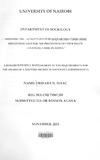| dc.description.abstract | The use of cyber space as a platform and catalyst for sophisticated as well as organized crimes is of concern to governments worldwide. Cyber crime is currently a major global concern given the economic losses companies incur world wide as a result of the crime. This study sought to assess the capacity of CID Headquarters Cyber Crime Prevention Unit in preventing cyber based financial crimes in Kenya. Unofficial reports show that in the third quarter of the year 2010, bank fraud tripled to Kshs 1.7 billion.
The site of the study was CID Headquarters Cyber Crime Unit and involved 32 CCU officers while additional information was sought from 12 key informants who included 4 bank officials, a CCK official, an official of the Computer Society of Kenya, 4 specialists from the computer forensic firms an officer from the Anti Terrorist Police Unit. The study revealed that a majority of the respondents (40.6 percent) indicated that all resources were not adequately supplied at the unit while 31.3 percent of the respondents said that transport and forensic tools were not adequately supplied.
The study found out that out of all the respondents, 15.6 percent of the said that qualified personnel were in short supply in the unit while only 12.5 percent identified training as not provided at the unit. It was also found that majority of the respondents (37.5 percent) attributed lack of resources at CID CCU to an inadequate budget while 31.3 percent laid the blame on low understanding of cyber crime and poor ICT policy. Majority of the respondents (40.6 percent) indicated that liaisons and intelligence sharing was key in cyber crime prevention while 28.1 percent proposed upgraded IT infrastructure. Enhanced legislation was cited by 18.8 percent of the respondents while training of stakeholders was indicated by 12.5 percent of the respondents.
The study also revealed that majority (43.8 percent) of the officers at CID CCU investigated either between 1- 15 cases or between 53-200 cases of financial based cyber crime in the past one year. Only 12.5 percent of the officers investigated between 15 and 52 cases of financial based cyber crime in the past one year. The most cited reason given by 53.1 percent of the officers for not being able to solve cases of financial based cyber crime was the lack of transboundary cooperation followed by legal and investigations drawbacks which was chosen by 34.4 percent of the officers. Lack of cooperation by ISPs was selected by 6.3 percent of the respondents while political interference and lack of software equipment were each chosen by 3.1 percent of the officers.
It was also found that most of the officers (28.1 percent) were for chose continuous and contextualized training as the best way of addressing limitations in operations at the CID CCU. Enhancing funding for equipment, software and remuneration was cited by 21.9 percent of the officers while placement of qualified management was the choice of 15.6 percent of the officers. 12.5 percent of the officers were for recruiting and retaining qualified officers whereas the same percentage cited enhancing legislation and policy making. 9.4% of the officers were for correct placement and specialization. The study therefore concludes that high turnover of specialized officers at the CCU unit was as a result of transfers within the force or resignations. Inadequate budgetary allocations and resources, lack of recognition and liaisons with financial institutions and other stakeholders and also the lack of mutual legal agreement and clear legislation have greatly accounted for the incapacitation of CID CCU in the prevention of financial based cyber crime in Kenya.
Important recommendations offered in this study include government to ensure that the legal instruments available are reviewed constantly to ensure that they are punitive and deterrent in nature.
The government should sensitize and educate law enforcement agencies, the public, and financial instifutions on the importance of protection against cyber based financial crime. Organizations such as the KBA should collaborate with industry players and stakeholders to offer sensitization programs. The government should ensure strong legislation and legal cooperation with other countries. Capacity of CID CCU should be increased through adequate budgetary allocations, proper deployment practices and stronger liaisons especially with financial institutions and other intergovernmental agencies such as Immigration, Kenya revenue authority, and treasury. | en_US |

